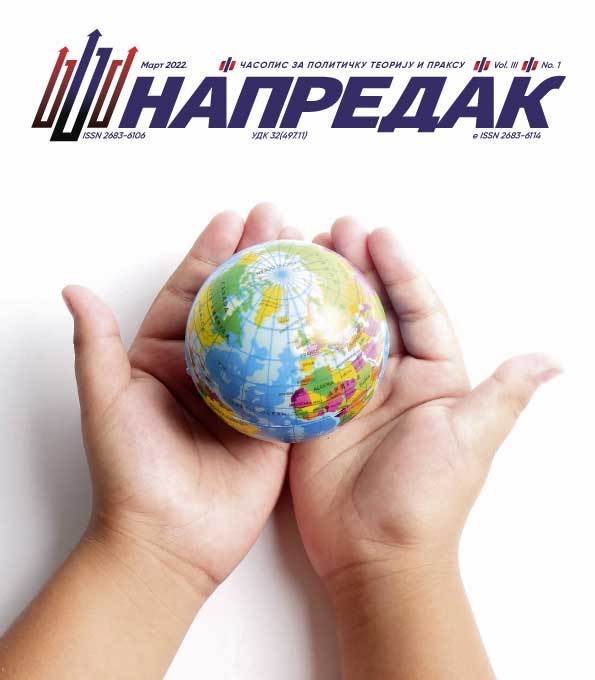Употреба наслеђа у спољној политици Републике Србије: кратак преглед досадашње праксе и савети за даљи развој
Sažetak
Водећи се теоријским основама музеологије и херитологије да предмет баштине представља извор
информација, овај рад анализира употребу наслеђа у спољној политици Републике Србије кроз две студије случаја. Рад нуди преглед неких досадашњих употреба, попут употребе српског средњовековног наслеђа на Косову и Метохији ради спречавања уласка Косова у UNESCO 2015. године и активне употребе римског наслеђа ради представљања Србије као дела европског дискурса, али нуди и смернице за могућу даљу употребу, тј. практичне савете како приступити наслеђу и на који га начин најефикасније инкорпорирати у културну дипломатију и баштинску дипломатију ради постизања одређених спољнополитичких циљева.
Reference
Cull, N. (2008). Public Diplomacy: Taxonomies and Histories. The Annals of the American Academy of Political and Social Science, 616(1), 31–54.
Dietler, M. (2005). The archaeology of colonization and the colonization of archaeology: theoretical challenges from an ancient Mediterranean colonial encounter. In Stein, G. (ed.) The Archaeology of Colonial Encounters: Comparative Perspectives (33–68). Santa Fe: School of American Research Press.
Hewison, R. (1987). The Heritage Industry: Britain in a Climate of Decline. London: Methuen.
Krivošejev, V. (2014). Heritage Management and Sustainable Tourism. Valjevo-Beograd: Narodni muzej Valjevo & Artis Centar [In Serbian].
Kuzmanović Z. & Mihajlović, V. (2018). Roman Emperors and the Construction of Identity in Contemporary Serbia. In A Better Past: The Invention of Tradition and New Identities (128–132). Beograd: Evoluta [In Serbian].
Maroević, I. (1993). An Introduction to Museology. Zagreb: Zavod za informacijske studije [In Croatian].
Mensch, P. (2015). Towards a Methodology of Museology. Beograd: Muzej nauke i tehnike [In Serbian].
Merryman, J. (1985). Thinking about the Elgin Marbles. Michigan Law Review, 83(3), 1880–1923.
Mujović–Prajs, V. (2019). Cultural Diplomacy as an Actor in the Change of the Republic of Serbia’s Image (doctoral thesis).Beograd: Fakultet za medije i komunikacije Singidunum [In Serbian].
Nye, J. (2004). Soft Power: The Means to Success in World Politics. New York: Public Affairs.
Popadić, M. (2015). Time Past in Time Present: An Introduction to Heritage Studies. Beograd: Centar za muzeologiju i heritologiju Filozofskog fakulteta Univerziteta u Beogradu [In Serbian].
Popadić, M. (2021). The Discrete Murmur of the Sandglass: Heritage and Its Sciences. Beograd: Centar za muzeologiju i heritologiju Filozofskog fakulteta Univerziteta u Beogradu [In Serbian].
Šola, T. (1984). A Contribution to a Potential Definition of Museology. Informatica museologica, 15(1-3), 8–10 [In
Croatian].
Todorović, M. (2021a). Gaining Soft Power through Hard Heritage: Turkey’s Restoration Projects in Serbia. In: Abdula, S., Murtezani, S. & Bela, B. (eds.) Proceedings from the 1st Balkan Studies Congress: September 17-19, 2021. (383–396). Skopje: Fettah Efendi, YTB & International Balkan University.
Todorović, M. (2021b). TİKA’s Heritage Restoration Projects: Examples of Foreign Aid or Proof of Neo-Ottomanism?. Insight Turkey 23(3): 141–156.
Todorović, M. (2021c). Serbia and Egypt: Serbian–Egyptian Intercultural Relations. Belgrade: Alia Mundi [In Serbian & English].
Todorović, M. (2022). Heritage In and As Diplomacy: A Practice Based Study. [Forthcoming; In English].
Tsaliki, L. (2007). The Construction of European Identity and Citizenship Through Cultural Policy. European Studies, 24, 157–182.
Tunbridge, J. E. & Ashworth, G. (1996). Dissonant heritage: the management of the past as a resource in conflict.
Chichester: John Wiley.
Žolt, L. & Koković, D. (2017). Sociology of Culture with Elements of Cultural Anthropology. Novi Sad: Mediterran
Publishing [In Serbian].
Winter, T. (2015). Heritage diplomacy. International Journal of Heritage Studies, 21(10), 997–1015.
B92 (2015, October 30). #NoKosovoUnesco: Campaign against Kosovo’s UNESCO bid.B92. Available at: https://www.
b92.net/eng/news/politics.php?yyyy=2015&mm=10&dd=30&nav_id=95886 .
Jovanovic, I. (2015, October 26). Serbia Plans Kosovo Online Propaganda Campaign. Balkan Insight. Available at:
https://balkaninsight.com/2015/10/26/serbia-to-launch-internet-campaign-on-kosovo-10-26-2015 .
Nikolić, T. (2015). Address by H. E. Mr. Tomislav Nikolic, President of the Republic of Serbia, to the Ambassadors
Accredited in Belgrade, Following Albania’s Proposal Concerning the Admission of the So-Called “Republic of
Kosovo” To UNESCO. Beograd: Ministarstvo spoljnih poslova.
RTS (2015, July 16). Kosovo Filled a Request to Join UNESCO. Radio Televizija Srbije. Available at: https://www.rts.rs/
page/stories/sr/story/125/Dru%C5%A1tvo/1979872/Kosovo+podnelo+zahtev+za+%C4%8Dlanstvo+u+Unesku.
html [In Serbian].
UNESCO (2007). Convention Concerning The Protection Of The World Cultural And Natural Heritage: World Heritage Committee Thirty First Session – Christchurch, New Zealand 23 June – 2 July 2007. Paris: United Nations
Educational, Scientific and Cultural Organization.
Çollaku, P. (2015, November, 9). Kosovo Not Accepted Into UNESCO. Balkan Insight. Available at: https://balkaninsight.
com/2015/11/09/kosovo-nije-primljeno-u-unesko-11-09-2015/?lang=sr [In Serbian].

